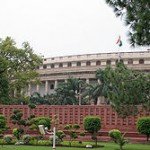Know The Role of Indian Parliament in Democracy – Stop The Disruptions!
Indian Parliament which consists of the President of India, Loksabha and Rajyasabha, is the primary law making authority in India.
- Why does India need Parliament?
- What should happen inside parliament?
- What really happens inside parliament?
- Why are we selecting representatives to Parliament?
- What you should essentially understand about democracy?
- What happens if the Parliament is not allowed to function?
Why does India need Parliament?
Parliament is the place where the question ‘how the country is to be ruled’ is decided. Dictators or aliens cannot make a law in India since we are a democracy, and for us, only elected representatives can do it. It is primarily for this purpose that we elect them – to make better laws, rules and provisions for us. Parliamentarians are supposed to present good bills and get it finally converted to an act(law). There can be executive decisions on policies and plans, but since they are not related with laws, it won’t come under parliament (legislature).
What should happen inside parliament? (functions and day-to-day activities)
Parliament doesn’t function 365 days an year. It normally meets only for 3 sessions an year – Budget session, Monsoon Session and Winter session, and the sum total of days Parliament normally function (parliament days) comes only around 80- 100 in a calender year.
The bills(draft plan for new laws), need to be submitted within this short span, and get it approved with a majority support to get it passed as an act(law). Before that proper discussions have to be done in both houses about the provisions in each bill. That is how a constructive democracy function. Members are supposed neither to sleep while a new bill is introduced nor to create ruckus! Parliament is supposed to be a place where parliamentary language is used; it is supposed as an association of civilized and educated people. (Education doesn’t mean engineers and doctors, education is a state of mind achieved, and has nothing to do with qualifications!)
Opposition in the Parliament should listen to the ideas of the ruling party, encourage it if it is good for the nation and can even bring new ideas. If opposition is not satisfied with a bill, there are several provisions including voting on the bill. Being a opposition doesn’t mean opposition of everything or opposition for the sake of opposition.
In democracy, it is always the majority decision which prevails. If opposition parties think that a bill is totally harmful to the nation, but if those who think the same are a minority, in a civilized world the answer to the situation is not ruckus or disruptions in the parliament to express the feelings. They can convey their views back to the people, and can even reverse the bill, if they get a majority in next elections.
What really happens inside parliament?
Ruckus. Repeated adjournments. Disruptions. Belligerence. No laws. Lawlessness. Elected representatives forget for what they are elected for.
Why are we selecting representatives to Parliament?
We are selecting our representatives to Parliament because –
- We don’t have time to sit in parliament. ( True, right? uh?)
- We think these leaders know better than us what can be a good law for the nation.
- We think these guys represent us there, and say our voice.
What you should essentially understand about democracy?
Democracy is rule by people. It is the people who are the supreme authority in the system of democracy (and not dictators or kings). People elect their representatives and pay taxes to get their needs done. Government is just a centralized system representing people, and that is same as with Legislature, Executive as well as Judiciary. Since democracy is rule by the interests of people, only majority interests can be favored to be implemented. Neglect of minority interest is the main draw back in democracy, and that is fixed by providing additional safety measures for minority interests too.
Since a government is formed only if they have majority in the parliament, their decisions should get the primary weightage, as theoretically, they represent the will of majority of the population. Those who are against the government are a minority and they are supposed to respect majority interest, and express their apprehensions through peaceful negotiations and discussions, but certainly not by obstructing the functioning of the houses.
What happens if the Parliament is not allowed to function?
- New laws cannot be formed. India is in urgent need of a variety of new laws and regulations like Lokpal Bill, Whistle Blowers Bill, Women Reservation Bill etc.
- Draw backs of existing laws cannot be rectified.
- Loss of nearly 5 Crore rupees/day to the exchequer.
- Democracy cannot prevail in our country.
- Certain laws get passed without proper discussion or voting.
- For peaceful functioning of any state, there should be laws. These laws cannot be made by executive nor the judiciary. Laws for people should come from the people itself, and only a body of elected members can make laws for them.
- There won’t be good laws in the country like the Right to Information Act (2005) or Right to Education Act (2009) , and that means country will still remain corrupt and poor.
- Lack of modern progressive laws will cause slow down in agricultural, industrial and service sectors.
